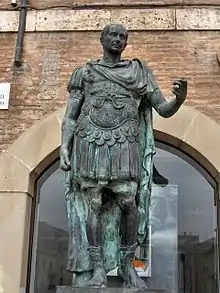Caesarism
Caesarism is an authoritarian or autocratic political philosophy inspired by Julius Caesar.[1][2] It has been used in various ways by both proponents and as a pejorative.

Historical use of the term
The first documented use of the word is in the 19th century when it was used by German historian Johann Friedrich Böhmer in 1846 to describe the state subordinating the Church to its control. [1] In 1850 it was used again by Auguste Romieu, who defined Caesarism as the rule of military warlords.[1] Sociologist Peter Baehr writes "following Romieu's polemic "Caesarism"...[Caesarism] gained vogue status". In 1857 religious writer Orestes Brownson used it to mean monarchical absolutism.[1] In 1858 the Westminster Review wrote "clumsy eulogies of Caesarism as incarnate in the dynasty of Bonaparte".[1]
Benjamin Disraeli was accused of Caesarism in March 1878 when, in anticipation of war with Russia, he mobilised British reserves and called Indian troops to Malta. G. K. Chesterton made one of the most ringing denunciations of Caesarism in his work Heretics, calling it "the worst form of slavery".[3]
Sociologist Max Weber believed that every mass democracy went in a Caesarist direction. Professor of law Gerhard Casper writes, "Weber employed the term to stress, inter alia, the plebiscitary character of elections, disdain for parliament, the non-toleration of autonomous powers within the government and a failure to attract or suffer independent political minds."[4]
A so-called "democratic" form of Caesarism has been advocated by theorists like Venezuela's Laureano Vallenilla Lanz in Cesarismo Democrático (1919).[5] The most famous person who themselves espoused Caesarism was Napoleon Bonaparte, who admired and emulated Caesar during his rule in France.[6] Italian Duce Benito Mussolini and the ideology of Italian Fascism espoused Caesarism.[7] Spanish Caudillo Francisco Franco and the ideology of Francoism espoused Caesarism.
See also
References
- Baehr, Peter (2009). Caesarism, Charisma and Fate: Historical Sources and Modern Resonances in the Work of Max Weber. Transaction Publishers. pp. 32–35. ISBN 978-1-4128-0813-2.
- "Caesarism". The Free Dictionary.
- G.K. Chesterton. "Heretics".
- "Caesarism in Democratic Politics: Reflections on Max Weber".
- von Vacano, Diego A. (2012). The Color of Citizenship: Race, Modernity and Latin American / Hispanic Political Thought. Oxford, UK: Oxford University Press. pp. 83–111. ISBN 9780199746668.
- Weber, p. 54
- Emilio Gentile, The Struggle for Modernity: Nationalism, Futurism, and Fascism. Westport, Connecticut: Greenwood Publishers, 2003. pp. 137–138.
